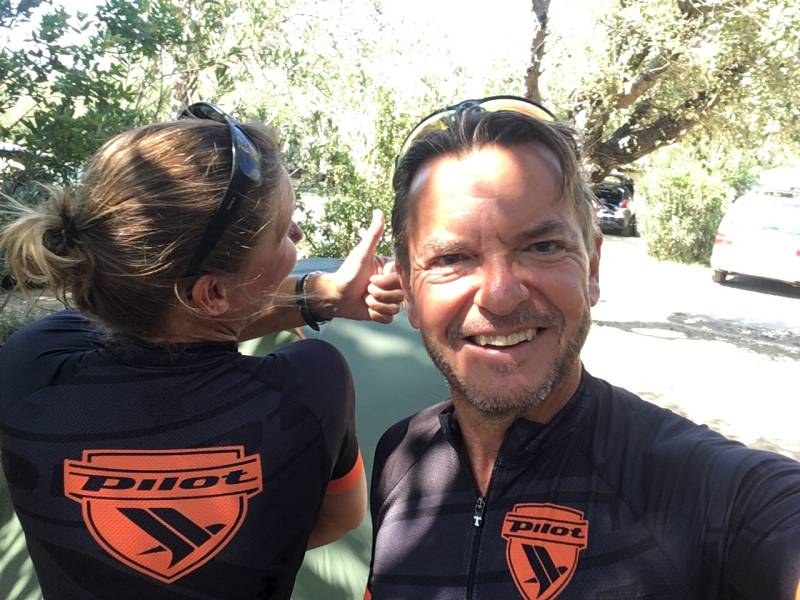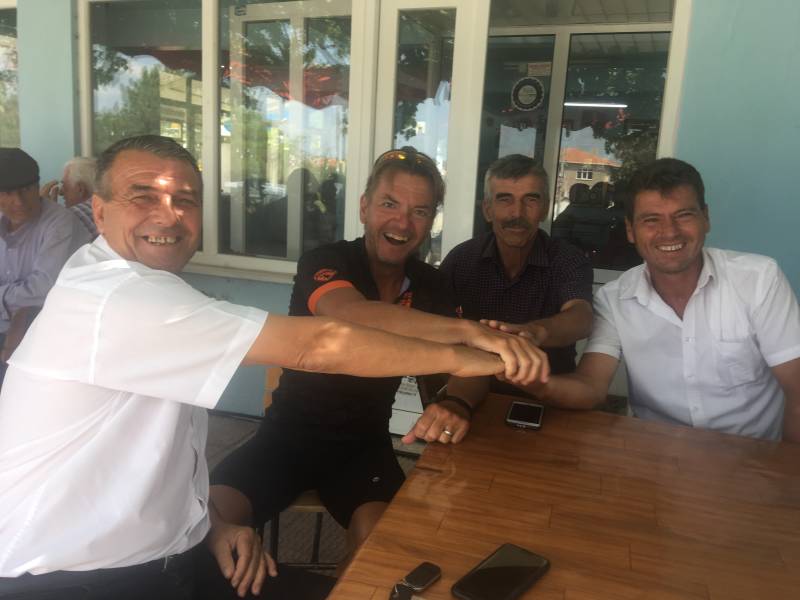From the pass at the border between Bulgaria and Greece at Makaza, we see a brand new way down. A few hundred meters after the border, both bicycle route planner bikemap.com as maps.me ignore this masterpiece of civil engineering work and to choose the old road. Already after 100 meters we regret choosing the old road. Instead of descending, we have to climb over the mountain top while the new road passes through with a tunnel. However, the regret quickly disappears when it turns out that no car (or other transportation vehicle) drives on this road anymore. We have this very acceptable old route for ourselves. After that first part of the climb we can also start a great descent. We hope to see the Mediterranean Sea, but that does not work. It is more correct to write the Aegean Sea. A few years ago we cycled from home on the rather simple 'Green Road to the Mediterranean' which ended for us in the French town of Sète. Now we cycled the mountain route to the Mediterranean Sea: many kilometers and definitely a lot altitude meters more.

At the bottom of the descent we enter the Greek university town of Komotini. We cycle trough the center and see that on a Sunday most stores are closed and the students celebrate summer holidays. There is a serene calm with many almost empty terraces. Supermarkets are closed. Mini markets and kiosks that might be open are missing in the streetview of Komotini. We have lunch at a fast food place that only offers half off what the menu made us believe. It became a salat and a pasta and fast we go back on the pedals towards the sea, another 30 kilometers to the south. The wind blows us in the same direction. That makes it hot. We are now much lower altitude than the last period and that is why it is already warmer. We still have a number of hills that continue to obstruct the view of the sea. Only 10 kilometers before the coast we see the blue water, our hearts beat faster and the heavy gear is used.
The intended campsite is 300 meters from the beach, but we don't stop. First to the sea! Harry pushes his bike into the sea (at least his front wheel) and Roelie kicks off her shoes and takes a dip in her cycling clothes in the cool water. It feels like a huge milestone. We will assemble a video of the collected video material from our route from Oirschot to the Greek coast. But first beer! At a nice beach bar called Thea's Bar offers cold beer, which is served in glasses from the freezer. Delicious and it feels like very deserved, only the price is a bit of a shock. In Bulgaria, half a liter of beer costs less than € 0.50. Here we pay € 3.50.
At the campsite we put our tent up again and work on the film. The WiFi is unfortunately lousy. The minimarket of the campsite is open but has such a defective assortment that it is impossible to cook a meal. We therefore cycle back to Thea's bar. A carafe of wine, tzatziki, kebab, Greek salad and the milestone party is complete. But also here is the WiFi insufficient to put the video on Facebook.
The next day we cycle along the coast to the Greek city Alexandroupoli. A short stage that we eventually takes a long time. Part of the route is fantastically beautiful but more suitable for MTBs without luggage. We cycle over a hilly terrain, between the rocks and the olive trees, over loose boulders and gravel. We pass an old amphitheater and unrecognizable historic city walls. We do not meet anyone and the views are all breathtaking.

When Alexandroupoli gets closer, we get asphalt under the tires again but we still make little progress due to a strong headwind from the northeast. Thirsty, overheated, dusty and tired we reach the city limits. We choose the Municipality Camping on the city beach. A very nice campsite with a beach bar, mini market, shady places, clean bathrooms and excellent WiFi (at the reception at least). We expect the promised shirts from Pilot Cycles at the post office. They are according to DHL in Athens and can arrive at Alexandroupoli any time. For security and to enjoy the sea, we decide to book two nights. That turns out to be four, so we had to move our tent after two nights to a new spot. We spent a wonderful time in which we relax and meet very warm people: the Turks Ahmet and Zuhal with their kids, Iskander and his girlfriend and the Bulgarian world traveler Rumyana with her daughter. We picked up the shirts on day three and on day four we look forward to a new chapter: Turkey.

The road to Turkey is directly against the wind and we clubbing through it. We also cycle along a delta a paradise for birds. We see a gigantic group of storks. There are at least 100. Beautiful sight but unfortunately not to capture on picture or film (at least not with the equipment we have).
The border passage is progressing well. A Bulgarian family gives us Bulgarian leftover money. They do not speak a word of English or German and we still do not speak Bulgarian. Together with the difference in what is customary with yes and no nodes, this initially leads to some confusion. After a while they take the money, but they think we want to receive Turkish lira's back. We just want to make them happy and it is not that much. They are ultimately take it, but the wonder remains visible for a long time on their faces.
We are nicely in the queue for the different checkpoints. A young couple on a motorbike from Istanbul is standing in line next to us and is asking about our trip. We see that travelers have to travel the other way (much) longer. There are countless Dutch people in the queue who have spent the holiday in their home country. We greet our fellow countrymen with enthusiasm and we get a lot of cheers and encouragement: "The Netherlands !!". After a few kilometers of driving through this traffic jam, our enthusiasm drifts and we feel sympathy for all the waiting in the blazing sun. Many cars and motorcycles overtake us on the highway. A lot honk and wave to us. Extra cheers we get from the Bulgars family with our leftover money, the couple from Istanbul and the motorcyclist who catch up with us.
After 15 kilometers Turkey, just after Ipsala, we leave the highway and reach the village Esetçe. On a square in the small village we immediately get to know one of the aspects of Turkish culture. We see three terraces that are all populated by only men chatting and drinking tea. We walk into a shop to get a soft drink and an ice cream. Once we are outside, a friendly man approach us: "Hollanda?" and he points to the shirt of Roelie, which has 'Nederland' on the back . We nod and he starts to speak Turkish. We soon understand that he invites us to drink tea with him and his friends. His name is Esu and his friends Hasan and Ibrahim. We attract attention in our cycling clothes and with our foreign heads, Roelie is the only woman on the men's terrace. They ask how we came with the bikes and what our plans are. With a lot of gestures and use of our iPhones (photos, navigation apps and our website in terms of traveled and planned route around the world) we make a first acquaintance with Turkish friendliness and genuine interest. What a warmth these people radiate, it goes through all language barriers. A second round of tea is offered, but we have to go further because we want to go back to the coast again and that is another 50 kilometers. We explain with Google Translate that we have to cycle for another hour or three, then set up a tent and cook.

Via back roads we cycle for miles through the rice fields and later through the woods on hills. When we get to an asphalt road, it suddenly becomes crowded with traffic while we have to climb again. Fortunately, the route planner sends us into the forest after a few kilometers and we continue to climb the hills unpaved. No cars, only us and nature and the altimeters, which together with the strong wind from before is an extra challenge and creates a lot of sweat drops. At the top we cycle between the sunflower fields.

In the coastal town of Gökçetepe, we first visit a minimarket for the intended camping site. To our immortal satisfaction even a cold beer is sold. We did not expect that in Turkey, only hoped for it. We also buy some ingredients to cook a pasta at the tent in the evening and then cycle to the campsite. We have no idea what to expect. The descriptions were somewhat vague and the camp site is untraceable at most websites where you can find campsites. It would be a festival site, or a park, or nothing. We arrive at a gate where we get to hear (via an English speaking intermediary by telephone) that a night costs 60 lira. The intermediary indicates that we can put our tent in the "arrival zone". A good kilometer after the gate we see a camping area with unordered tents. Only tents. About 1000 people, music, song and dance. It indeed looks like a festival site. It is the week of the Festival of Sacrifice and the whole of Turkey has holidays. Istanbul alone has 15 to 20 million inhabitants and is not so far away. The shower is cold and flooded, the toilets are dirty and also flooded and there is only salt water which, after tasting, we rather not drink. Nobody speaks English in this ant nest. But the atmosphere is so relaxed and our pasta so wonderful, that we experience one of our best camping nights so far.
From Gökçetepe Tabiat Parkı we cycle back into the hills and become. as happened before in Serbia, beset by hordes of flies, who have provided for eyes, mouth, nose and ears. This time only double as much. Once at the top, the route planner sends us to a non-existent road or firebreak for the descent. That is not possible. We choose our own route that is next to the motorway and is inbox shape. But it is a road and it goes down, so you do not hear us complaining. What we do complain about is after the descent the road is still lousy of quality, the wind blows us back into the hills and Harry has a flat. At a gasstation on the motorway we decide after the tire is replaced to cycle on the motorway. We get to Gelibolu, or Gallipoli, on the wide stretch of road with nice asphalt. From the harbor you can see the coast of the Asian part of Turkey.

We check in at a Greek-style hotel, take a hot shower and get good advice on a Turkish restaurant. The menu is however abracadabra to us. The waiter sees our desperate faces and asks a German speaking customer to helps us with ordering and eating a spicy Adana sis kebab with pilav, salat and yoghurt. The next morning the hotel treats us to a great Turkish breakfast and then we say goodbye to the European part of Turkey and get on the boat to the Asian part. Goodbye Europe, hello Anatolia! On the Asian side Harry first gets a special treatment at the hairdresser. We will start our next blog ...


